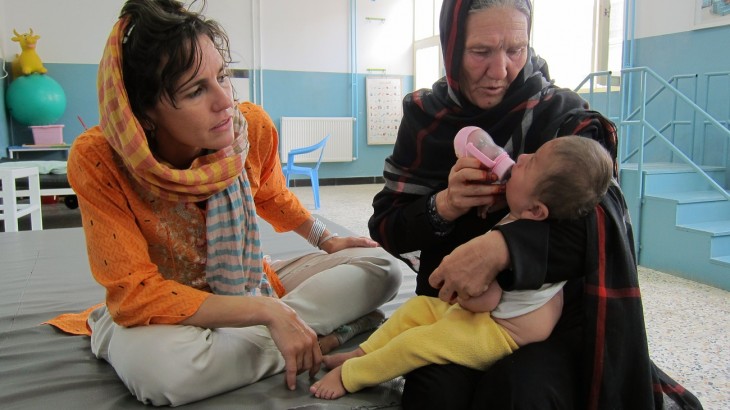Why a radiant Spanish physiotherapist was so well loved

The International Committee of the Red Cross family remembers Spanish physiotherapist Lorena Enebral Perez, 38, a passionate and dedicated professional who was killed in Afghanistan on Sept. 11.
The relationship Lorena had with children was magic. It was magic because she knew exactly how to approach a child, even those with the most difficult disabilities.
The children we help have severe physical and cognitive problems. Some can't interact with people. Some can't even smile. That wasn't a problem for Lorena; she adopted them. No one else could communicate with them like she could, sometimes not even close family members.
Only Lorena.
She laughed a lot. She joked with patients. The rehabilitation centre has changed now. All our colleagues have changed. The patients have changed. The loss of Lorena hangs in the air.
Whenever Lorena was around the environment was radiant. A huge smile flashed across her face when she saw you. It was her way of saying hello. And she was like that with all her patients, some of whom have no one to smile at them.
She loved to run and I love to run so we used to talk and joke together. Whenever I was running on the treadmill she would teasingly check to see if my pace was fast enough. That energy of hers was contagious. You cannot be upset around Lorena, because no matter how big your problem was you could handle it. That's how she made you feel.
She liked Afghanistan. In fact she extended her mission here. When we went to the region of Panjshir – a fairy tale landscape of verdant hills and sparkling waterways -- we wished we could run free. In Mazar-e-Sharif, Lorena was on the climbing wall we have, and people told me she nailed all the routes. She was so strong.
And generous. When I arrived in May I was so new and didn't know my way around. She prepared a box of food for me so I would have dinner. She wouldn't even accept money when I tried to pay.
Somehow she made endless meals with seemingly endless supplies. Her cupboards were stuffed with chocolate and cheese. She patiently taught us the recipe for the Spanish specialty Gazpacho. She told us we could cheat and add ice cubes to the room-temperature dish, even though in Spain this would not be allowed.
It sounds silly to say she is unforgettable, but what has happened shook all of us who knew her, and there are a lot of us. I think something will not be the same anymore. When you go on a mission with the International Committee of the Red Cross you form a special relationship with someone. Same space. Same job. Same hardships.
Same joys.
So you share a lot. And immediately we had a good feeling together and we were already friends, and this is the first time this has happened and I do not know how I will adjust.
It was 8 a.m. when we first heard news of a shooting. I called her number and sent a text message. There was no response. And then I called a physiotherapist in Lorena's centre who confirmed the shooting with a broken voice of horror. I was shaking, I had to close the door to my office to go out and I couldn't do it. And then we had to wait, wait, wait.
While Lorena was at the hospital, there was still hope. But then her death was confirmed. I didn't really believe it at first. I collapsed and I was crying loudly.
Dead. At the hands of a patient in a wheelchair. I am sad and I am angry, but I am trying not to judge.
Instead I focus on the radiance of Lorena. She stayed up until 2 a.m. just the other night to finish her registration for a graduate school course in Madrid in neurological treatments for adults and children. She was planning for the future to become even better.
Drive, dedication, energy, affection. Every time I saw her, that first reaction on her face, the loud voice she had, the very strong hug, and the smile -- she just engulfed you with her presence. Engulfed you with love. And that will be my lasting memory of Lorena.
This composite essay was based on the experiences, memories and feelings of ICRC colleagues Lucia Bernhard, Joelle Rizk, Suraiya Behbood, Silas Muriungi Mukangu and Margaret Dudgeon.
